
The history of cinema in Quebec started on June 27, 1896 when the Frenchman Louis Minier inaugurated the first movie projection in North America in a Montreal theatre room. However, it would have to wait until the 1960s before a genuine Quebec cinema industry would emerge. Approximately 620 feature-length films have been produced, or partially produced by the Quebec film industry since 1943.
Donigan Cumming is an American-born Canadian multimedia artist who uses photography, video, drawing, sound, and text in experimental documentary films, collages, installations, and books based in Montreal, Quebec. Since 1983, Cumming's work has contributed to Canadian and international festivals and exhibitions dealing with themes of the body, truth/fiction, taboos of representation, and social engagement.
Albert Nerenberg is a Canadian independent filmmaker, actor, journalist, hypnotist, and laughologist. His films include Stupidity (2003), Escape to Canada (2005), Let's All Hate Toronto (2007), Laughology (2009), Boredom (2012) and You Are What You Act (2018). Both Stupidity and Laughology are the first feature-length documentaries to discuss the topics of stupidity and laughter.

Brett Gaylor is a Canadian documentary filmmaker living in Victoria, British Columbia. He grew up on Galiano Island, British Columbia. He was formerly the VP of Mozilla's Webmaker Program. His documentary, Do Not Track, explores privacy and the web economy.
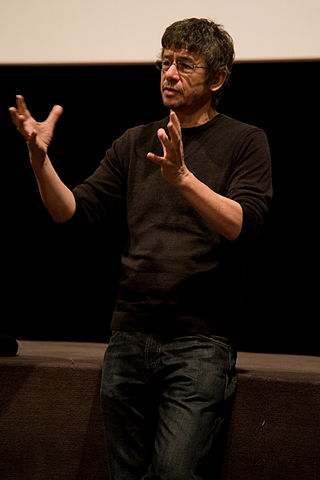
Philippe Grandrieux is a French film director and screenwriter.
Laughology is a 2009 documentary film about the contagiousness of human laughter by Canadian filmmaker and Laughologist Albert Nerenberg. It is the first feature-length documentary about laughter. The documentary makes the case that laughter is the original peace signal and the human ability to share and transmit laughter may have been key to the rise of human civilization. The film chronicles unusual laughter phenomenon such as Holy Laughter, Laughter Parties and the Tanzanian Laughter Epidemic. The film is produced by Elevator Films which operates out of Lac Brome, Quebec, and Cache Film and Television. The film made its world premiere at HotDocs Film Festival in Toronto.
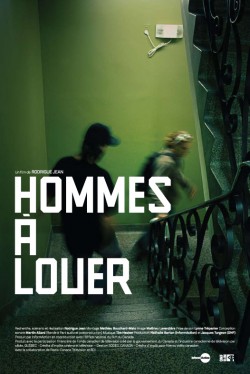
Men for Sale is a 2008 documentary film by Canadian director Rodrigue Jean, about male prostitutes working in Montreal, Quebec, Canada. The film was shot over a one-year period in Montreal's Gay Village.

Kaniehtiio Alexandra Jessie Horn, sometimes credited as Tiio Horn, is a Canadian actress. She was nominated for a Gemini Award for her role in the television film Moccasin Flats: Redemption and she has appeared in the films The Trotsky, Leslie, My Name Is Evil, and The Wild Hunt, as well as the streaming television horror series Hemlock Grove and the sitcoms 18 to Life, Letterkenny and Reservation Dogs.
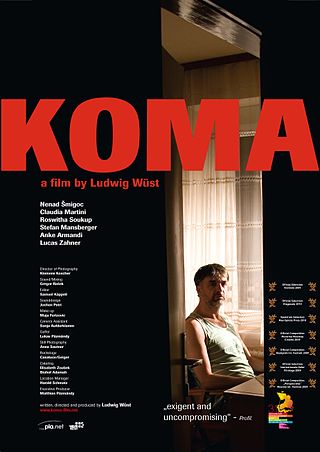
Coma is a 2009 Austrian film written and directed by Ludwig Wüst.

Anne Émond is a Canadian film director and screenwriter, currently based in Montreal, Quebec.

Gambling, Gods and LSD is a 2002 Canadian/Swiss experimental documentary film by Canadian film director Peter Mettler. It was shot between 1997 and 1999 in Canada, the United States, Switzerland and India, and is a "fragmented narrative" that shows what people do to discover themselves and find happiness.
Seth’s Dominion is a 2014 National Film Board of Canada animated/live action documentary directed by Luc Chamberland about the Canadian cartoonist Seth.
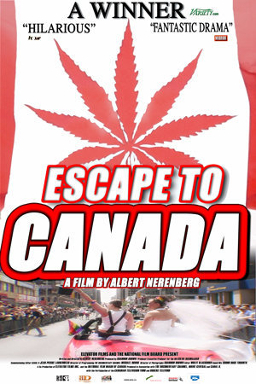
Escape to Canada is a 2005 Canadian satirical documentary film written and directed by Albert Nerenberg, with cinematography by producer Shannon Brown, the debut feature of their production company, Elevator Films, commissioned by the Documentary Channel, Canal D, and the National Film Board of Canada. The film examines the results of Canada's relaxing of its marijuana laws at the same time that same-sex marriage became legal, along with Canada's abstention from the U.S.-led invasion of Iraq having made the country a perceived haven for progressive Americans. The documentary's events begin in the summer of 2003 when both same-sex marriage and marijuana were legalized. The film underscores the contrast between the liberal movement in Canada and the more conservative attitude in the U.S., the premise being that "liberal attitudes beget liberal laws", and that "Canada, and not the U.S., is North America's pre-eminent freedom-loving country."
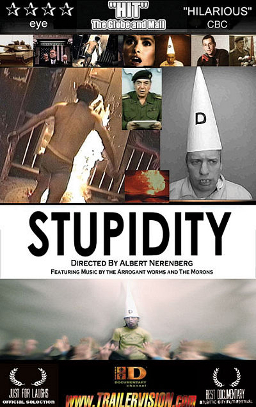
Stupidity is a 2003 Canadian satirical documentary film directed by Albert Nerenberg and produced by Shannon Brown, as the first film commissioned by the Documentary Channel. Nerenberg was also the film's executive producer. The film proposes that willful ignorance has increasingly become a strategy for success in the realms of politics and entertainment, that is, the "stupid" things that seemingly smart people do every day. The film questions "why stupidity is such a slippery concept to grasp and why so few people are talking about it." The film features songs by The Arrogant Worms and original music by The Morons.

You Are What You Act is a 2018 Canadian documentary film written and directed by Albert Nerenberg, and produced by Frédéric Bohbot. Commissioned by the Documentary Channel and Canal D, the film points out how film actors often become their roles and suggests these principles apply to ordinary people in terms of actualizing confidence, heroism, health and even love.
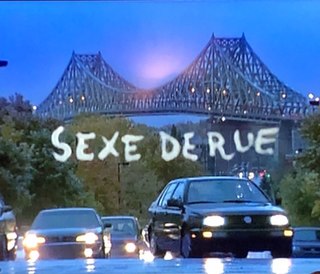
Sexe de rue is a 2003 Canadian documentary film about the history and current conditions of street prostitutes in the Centre-Sud of Montreal, written, directed and co-produced by Richard Boutet, who died of a heart attack on 29 August 2003, a few days before the film's premiere at the Montreal World Film Festival. The largely first person documentary gives a voice to street workers, allowing them to tell their own stories in their own words. Prostitution is discussed as labour and in the context of local history and relevant sociological factors, including dangers.

Jeremiah Hayes is a Canadian film director, writer and editor. Hayes is known for being the co-director, co-writer and the editor of the documentary Reel Injun, which was awarded a Gemini Award in 2010 for Best Direction in a Documentary Program. In 2011, Reel Injun won a Peabody Award for Best Electronic Media. Hayes was the co-editor of Rumble: The Indians Who Rocked the World, which was awarded a Canadian Screen Award for Best Editing in a Documentary in 2018.














